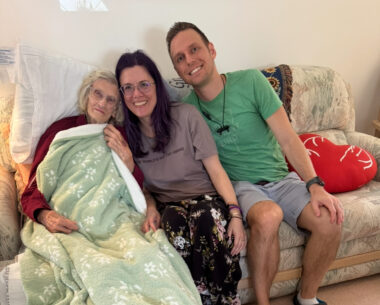The vicious cycle of hypoparathyroidism and grief
A hypopara body holds together long enough to finish an important project
Written by |

Having a chronic illness feels a little like being a hostage negotiator. It’s my functionality and I trapped behind an unpredictable chronic illness that’s got a chip on its shoulder and is out for blood. The alarm has been tripped and the medics are outside, but it doesn’t change the fact that there’s an ongoing battle inside.
Some days I’m lucky and I get a reprieve. Other days no amount of bribery, positive self-talk, or prescription medications will make it better. And on really unlucky days, a second player shows up: grief.
It’s strange how hypoparathyroidism and grief sometimes intermingle, but also perhaps not at all. Grief affects the entire body, sometimes causing inflammation, fatigue, immune system changes, increased pain, and upset stomach. Hypopara is a rare endocrine disorder caused by low levels of parathyroid hormone that also has far-reaching symptoms, including muscle spasms, fatigue, compromised immune system, and digestive issues — all similar to grief. Combine the two, and it starts a vicious cycle that’s hard to break.
Unfortunately, sometimes the only way out is through.
Overwork and mourning
Back in February, I wrote about hurrying to see a loved one for the last time. That amazing person was my grandma, who was 93 years old. When she entered hospice, she asked me to write her a book that “wouldn’t give her nightmares.”
It was a tall order, as the romance novel I was writing had ghosts and mythological demons. I set it aside and started working on fluffy contemporary romance. In a wild stroke of luck, I got a publishing opportunity soon after that with a hard deadline. I made a plan of how to keep my body going and got to work.
My grandma told everyone she was waiting until I finished the book, and she did! She held on as I worked 13-hour days, six days a week. After two months, 85,000 words, and a round of edits, I printed out the draft and my grandma held a copy in her hands. Her caregivers read the book to her every day, and she FaceTimed me to tell me it was “very beautiful!”

Heather Novak, center, with her grandma, Dorothy, and her spouse, Mike. (Courtesy of Heather Novak)
The following week, I took advantage of the publishing opportunity. My grandma told me she was proud of me and ordered me to rest. I lost her three days later. After reaching this nearly impossible goal — and fulfilling my grandma’s last wish — the grief and overwork caused my body to flare. I’d pushed too hard for too long.
The low-grade back spasm and arm discomfort from typing flared into throbbing pain. My arms swelled. The nerves in my legs and shoulders ached. My fatigue tripled.
My physical therapist was shocked at how much my body had tightened and spasmed since our last appointment, and we debated whether ice or heat would be better for my pain. While ice is good for inflammation, it can tighten muscles already in spasm. Heat works well for my muscle spasms, but it causes more inflammation. Inflammation can lower calcium levels — causing a vicious cycle of trying to control both.
I was saddled with unrelenting nausea that not even anti-nausea medication could curb, which made it difficult to eat and keep down my medications. I switched to chewable calcium for several days and sucked on peppermint and ginger candies.
Needless to say, it was a rough few weeks. Hypopara exacerbated the grief symptoms, which flared the hypopara symptoms, and so on. All hostage negotiations failed.
Thankfully, my medical care team and I worked together to help me stabilize. Adjustments to my physical therapy, added massage appointments, and extra mental therapy appointments filled my days. Multiple trips to my primary care physician for monitoring and labs helped with acute symptoms.
I challenged myself not to isolate and allowed my friends to visit, even when I was laid up on heating pads and wearing braces, because sometimes a hostage negotiation takes an entire team. With the help of my doctors, my partner, and the community I built around me — plus three weeks of extensive rest — my body grew less inflamed, the nausea ebbed, and my calcium leveled out.
While the grief and lingering inflammation remain, I’m finally back to work at a reasonable pace and taking a break from hostage negotiations. I’m so grateful my body held it together long enough to get me through the end of the book. Now it’s my turn to show my gratitude with rest, kindness, and a slower pace.
Note: Hypoparathyroidism News is strictly a news and information website about the disease. It does not provide medical advice, diagnosis, or treatment. This content is not intended to be a substitute for professional medical advice, diagnosis, or treatment. Always seek the advice of your physician or another qualified health provider with any questions you may have regarding a medical condition. Never disregard professional medical advice or delay in seeking it because of something you have read on this website. The opinions expressed in this column are not those of Hypoparathyroidism News or its parent company, Bionews, and are intended to spark discussion about issues pertaining to hypoparathyroidism.






Dina Attia
My most sincere condolences. I know how hard it is to manage hypopara and grief. I lost my mother suddenly 2 1/2 years ago when I was still on standard care. I could barely function for months and my hypopara body just got so much worse. I am now in a clinical trial and coming back to what could be some semblance of normalcy is mentally a lot more challenging than I thought it would be. Congrats on being able to solder on and get published! I hope someday to get to a point where I’m a productive part of society too.
Heather Novak
I'm so sorry to hear about your mother! Losing a parent is so hard, and it's even more difficult without stable treatment. I hope the clinical trial helps you feel better. It took me a solid chunk of time (and a lot of therapy) to get my feet under me again after my own trial. Wishing you all the best!